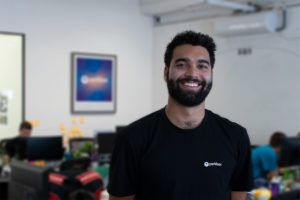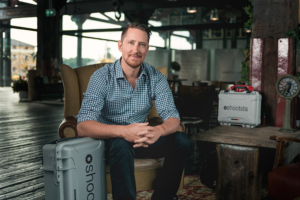Despite the massive disruption wrought on the economy and many businesses by the coronavirus pandemic, the second half of the 2020 financial year was a manna from heaven for many startups – yet the opposite for others.
And now we have a new financial year underway, amid continued uncertainty with infection rates in NSW and Victoria on the rise again, we asked a mix of investors and founders how they saw the next 12 months playing out for Australia’s startup sector. Here’s what they said.

Giant Leap Fund investment manager Rachel Young. Photo: supplied
Rachel Yang
Investment Manager, Giant Leap Fund
There’s still so much uncertainty. It’s been nearly six months since COVID-19 hit the global economy and despite best efforts to buoy growth, we’re still in a holding pattern. Many are operating in hibernation as a result.
But this period has driven home the need for business solutions to real-world problems. It’s shone a light on some of our greatest challenges, such as climate change, inequality and workforce reskilling. And this hibernation period has given people the headspace they need to consider these issues and has cleared the way for new ideas to tackle them.
I am hopeful for the future. I do think we will be in a better place by the end of this financial year, as we’ll start to see that momentum we need to fuel a recovery. But it’s unlikely we will realise the fruits of that labour until FY22.

Mr Yum co-founders Kerry Osborn, Kim Teo (centre) and Adrian Osman
Kim Teo
Co-founder and CEO, Mr Yum
2021 will be full of highs and lows for startups raising cash. Total capital deployed will likely be lower globally than the 2019 calendar year, though we’ll see the rise of the next big companies in the same way Slack, Square and AirBnB were born out of the GFC.
With plenty of dry powder available, investors will focus their attention on the categories that are advantaged by this new normal, possibly with a new-found keenness to invest in overseas companies, running meetings on Zoom and conducting their due diligence process remotely.
This is the silver lining of this pandemic for startups, who traditionally struggled to get overseas investment without arduous, in-person investor roadshows. Anything that removes borders for investment opportunities is a win-win for both backers and startups.

Ben Leeds, Perkbox Australia country manager.
Ben Leeds
Country Manager, Perkbox Australia
Australia will end FY21 in a better spot than where we are now, and possibly a lot better off than a lot of other countries.
While we’re still hurting from COVID-19, comparatively speaking, we have fared pretty well compared to other major economies. I think that trend will continue this financial year.
For us, that’s been reflected in an uptick in sales in this market compared to others around the world. That could lead more global companies to set up shop here, in anticipation of faster return to growth here than elsewhere around the globe.

Carbar CEO Des Hang
Des Hang
Co-founder and CEO, Carbar
FY21 is going to a tough year for most established businesses and start-ups, especially as the pandemic evolves and government assistance dries up.
Our startup ecosystem however may be well placed to better capitalise on changing market conditions. More than ever, today’s consumer will be searching for flexible living and financial stability. This has been amplified off the back of this pandemic. Emerging companies that have a focus on serving these needs with strong unit economics and underlying profitability will see the year out strong.
Many of today’s most successful startups, like AirBnB and Uber, were founded slightly before, during or slightly after a recession. They simply had great product market fit, after the GFC created a situation where many were looking to earn more money or create an income for themselves.

Shootsta’s Mike Pritchett
Mike Pritchett
Founder and CEO, Shootsta
This financial year, COVID-19 will continue to split the startup ecosystem. Some sections of it will do very well out of this, and obviously other areas have been completely hammered.
However, I think this crisis will get a lot more people thinking in an entrepreneurial mindset and we may see more startups emerge on the other side of the pandemic. I’ve had more people approach me wanting advice about business ideas in the past three months than I ever have before.It’s due in part to increased work flexibility, 4 day weeks and many people being furloughed.
Any large shift in buyer behaviour creates an opportunity for entrepreneurs. After COVID has run its course, the ecosystem will be better off. But I don’t think the best epidemiologist in the world would be able to predict when that will happen.

Tim Dickinson, GM of Platform at Assembly Payments.
Tim Dickinson
GM of Platform, Assembly Payments
We’re optimistic about the new global opportunities that will emerge out of COVID-19 this financial year. Right now, we’re going through the hardship of the pandemic, but there will be a rebound and a reset on how we do business. That could happen before 2021.
Any startup or company that has been able to navigate the challenges of COVID-19, will enter 2021 better equipped and prepared for the uncertainties yet to come. One of the most interesting things I’ve seen during the past few months is that many of the traits that startups aspire towards are the very characteristics which have made them able to adapt, respond and embrace the changes unfolding around us.
Agility, change and complexity have been part of our new normal for a couple of decades, and more so since the end of the dot-com boom. This period is a test of those principals.
While the circumstances around this accelerated change are dire, the ability for many parts of our society and economy to carry on and prosper is a good sign. This period is proof that when pushed into times of great uncertainty and difficulty, humanity brushes itself off, steps up and accepts new ways of thinking, doing and thriving.




















Trending
Daily startup news and insights, delivered to your inbox.